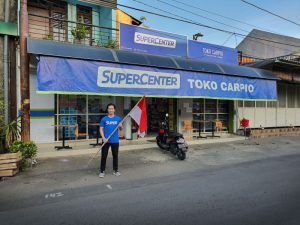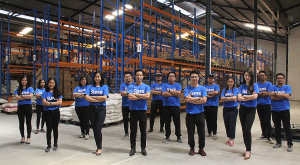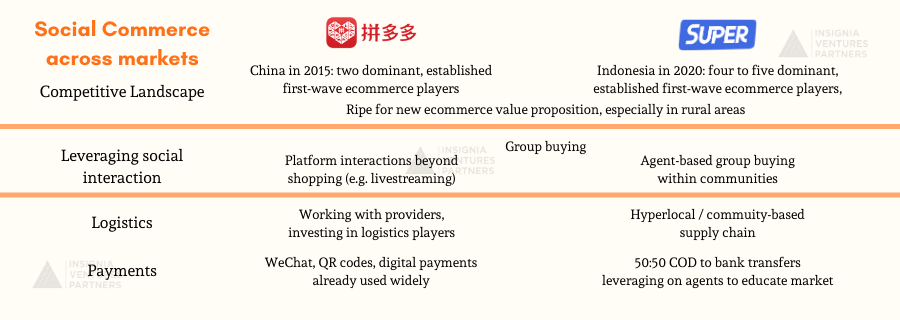Last week, I had the privilege of being on a panel on social commerce hosted by Tech in Asia with Pinduoduo Executive Director for Sustainability and Agricultural Impact Xin Yi Lim, moderated by Yinglan Tan, founding managing partner of Insignia Ventures Partners, one of our earliest investors.
The panel was a great opportunity to put side-by-side social commerce models in China and Indonesia. In this essay, I share some of my notes on the panel, thoughts on Super’s takeaways from the Pinduoduo model in China, and insights into how we’re building our own brand of social commerce to meet the needs of rural Indonesia.
When it comes to social commerce, Pinduoduo is easily one of the first names that come to mind with the pioneering work they did in China, now with 700 million annual active buyers and nearly 100 billion market cap. According to Executive Director for Sustainability and Agricultural Impact Xin Yi Lim, they started at the right time in 2015, when there were already two first-wave or traditional ecommerce players dominating the landscape, and the space was ripe for a new ecommerce proposition to enter the market.
The prerequisite enablers for ecommerce were also already well established in the country. Many people were already using ewallets like Alipay, and logistics had already improved its coverage in the country over the past ten years. WeChat was also already there as a powerful platform for connecting the population, and it was where Pinduoduo first started interacting with its users and building community.
Now social interactions have always been at the heart of Pinduoduo’s social commerce. Social commerce for them has always been based on capitalizing the relationships people have offline (e.g. family and friends) to improve their ecommerce experience online (i.e. insight into items that are relevant to the user, even if they themselves are not aware of it yet).
And even though in Indonesia, the culture, infrastructure, and environment differ, it’s the same fundamental question for us at Super. “How do we stimulate social interactions for ecommerce or more simply, better access to goods?”
The 200 billion dollar opportunity to build our brand of social commerce in Indonesia
The answer then becomes a matter of adapting to the local environment, the same way that, for example, Grab or Gojek did with the Uber model in their respective initial markets.
In Indonesia’s ecommerce environment, my co-founders and I saw a 200 billion dollar opportunity for us to provide better access to goods in rural Indonesia. And this is something we knew could best be achieved by leveraging on social interactions. While there’s a lot we have learned in that regard from social commerce companies like Pinduoduo, we’ve also been focused since day one on adapting our business to the needs and behavior of Indonesians in the communities we are in.
While there’s a lot we have learned in that regard from social commerce companies like Pinduoduo, we’ve also been focused since day one on adapting our business to the needs and behavior of Indonesians in the communities we are in.
When it comes to purchasing in rural Indonesia, QR is not yet as widely used for payments (versus China), and people are not used to transacting on mobile apps. They are not accustomed to going through several steps to make a purchase nor are they accustomed to reaching out to customer service if something goes wrong. Then when it comes to logistics, the sector remains fragmented with manufacturers having difficulty penetrating the last-mile segment in rural Indonesia.
This low adoption of digital payments and fragmented logistics in the country means that we are not operating in the same conditions as Pinduoduo was in China. We had to find a way to win the trust of consumers to eventually transition to online purchases.
Solving for trust online is a common theme in social commerce
According to Xin Yi, “solving for trust online is a common theme that has to be addressed, regardless of the market…whether it’s through games or other channels not directly tied to shopping…[it’s about] having that bond with Pinduoduo, so when you’re recommended things you’ll try buying those products.”
…solving for trust online is a common theme that has to be addressed, regardless of the market… – Xin Yi Lim
Livestreaming is one way that Pinduoduo builds trust through interactions. Consumers are able to get valuable information on the products that influence purchases and have many-to-many conversations on the products available on the platform. They have also leveraged on livestreaming to train 100K farmers across China to sell their goods online.

Steven at one of the SuperCenters (drop off points for agents to collect group buy orders) in East Java
For us at Super, given the ecommerce environment in Indonesia, building that bond with consumers is achieved by our B2A2C (or business to agents to consumers) business model. We bring together community leaders to Super’s network of agents, called SuperAgen, to aggregate the needs of their communities, specifically when it comes to FMCG goods.
This B2A2C model enables group buying, which is another big takeaway for us from the Pinduoduo model. With a GDP per capita of USD2000 in East Java (versus up to USD4000 nationwide), where most of our current customers are located, being able to purchase things at a lower cost is a highly attractive proposition. For our SuperAgen, the ability to earn an extra USD200 / month on average to their household income is very meaningful for them and their families.
More importantly, we are able to quickly build consumer trust with the online ecommerce experience at scale thanks to the network effects the community leaders have in driving the adoption of our application.
The backbone of our social commerce model: supply chain
The B2A2C model not only solves for consumer trust in our service and digital platform, but also addresses the logistics issues of rural Indonesia. The B2A2C model is built on a hyperlocal (i.e. community-based) supply chain model. This is why I often say that we are more than just a social commerce or ecommerce company, we are a social commerce company with a logistics backbone. Our biggest asset is our supply chain.
If first-wave commerce marketplaces relied on multinational and national logistics providers, social commerce for us at Super means building a hyperlocal supply chain. This supply chain is composed of three levels — the warehouse, the Super Center, and the Super Agen (agents).
We are more than just a social commerce or ecommerce company, we are a social commerce company with a logistics backbone. Our biggest asset is our supply chain.

Super CEO and co-founder Steven Wongsoredjo and team at Super warehouse
There’s the main core warehouse, usually as big as 2500 square meters, which is located as close as possible to the villages we cover. This serves as the drop-off point for manufacturers and suppliers, with whom we connect directly to get the best price and even free delivery cost once we have that working relationship and consistently order in bulk.
Then for each Super warehouse, we either deliver directly to the Super Agen or they come to pick it up at SuperCenters located in the village depending on the basket size of the group purchase (at least US$70 basket size for us to deliver directly). These SuperCenters are usually mom-and-pop shops we work with. Right now we have around 850 of these Super Centers across East Java.
Ultimately, this supply chain enables us to achieve more sustainable unit economics, reducing the costs that individual orders would entail at the scale we need to service our customers.
Social commerce is just the beginning for us at Super
This B2A2C model has catapulted our growth across East Java over these past two years, and COVID19 has since brought a surge in sales on our platform with people having limited options to purchasing groceries. We have grown our business 2x since the last time we raised our series A in December 2019. We also started working not just with FMCGs but also smaller SMEs producing hyperlocal FMCG products.
The first wave of ecommerce saw four or five kingdoms rise, and now the social commerce battlefield is opening up in Indonesia, similar to what the competitive landscape looked like for Pinduoduo in 2015. The country’s large market can hold two to three large players in this space, and among these large social commerce players, the selection of SKUs and target demography will be the key differentiators. For us that’s FMCGs and rural Indonesia respectively.
That said, social commerce is just an entry point for us. Just as Pinduoduo pioneered social commerce in China and over the past five years has been leveraging their model to vastly improve the farm-to-table supply chain and consumer experience in the country, so will Super tap into social commerce to change the way rural Indonesia gets FMCG goods.
In the next five to ten years, we aim to become the IndoFood for social commerce. Like them, we also have an ecosystem of white labelling products, distribution and retail, with SuperEats, SuperCenter, and SuperAgen respectively.
The ultimate goal is to create hyperlocal supply chain and hyperlocal private labelling for rural Indonesia.

Social commerce across markets: comparing Pinduoduo and Super brands of social commerce
***
You can reach me on Linkedin or via email to learn more about our work at Super. You can also listen to my conversation with Yinglan Tan on On Call with Insignia below.
About the author
Steven is the CEO and co-founder of Super, the first Indonesian social commerce startup to have graduated from Y Combinator. He was featured on last year’s Forbes 30 under 30 Asia list for his achievements in the start-up field in Indonesia, and is a Global Shaper at the World Economic Forum. He brings to the table his expertise building and mobilizing communities, having led campaigns that raised thousands of dollars for social causes with organizations like UNICEF. Steven holds a Master’s degree from Columbia University and graduated Magna Cum Laude from John Hopkins University.